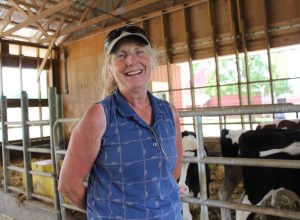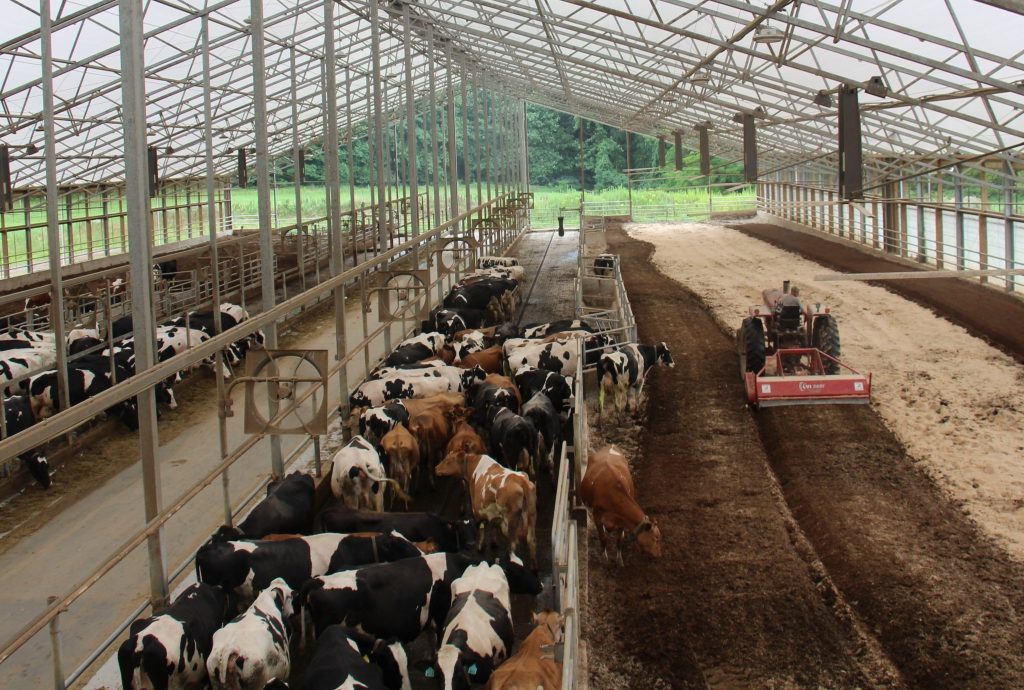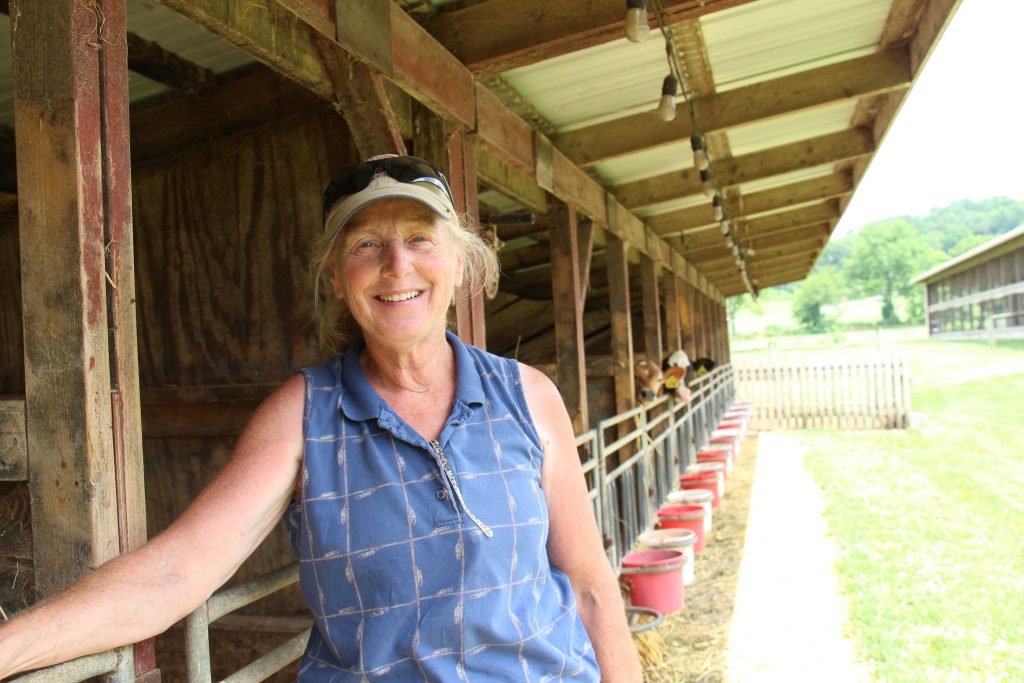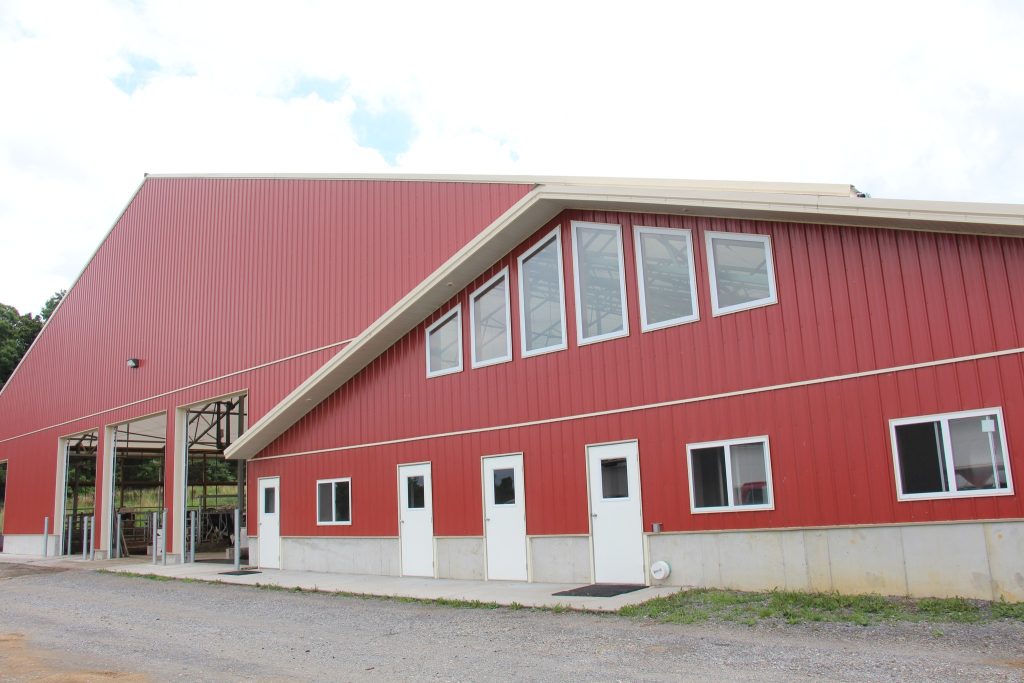
Phoebe Bitler Was Interviewed in the New Episode of “Cow-Side Conversations”
In the Center for Dairy Excellence’s latest episode of the “Cow-Side Conversations” podcast, Phoebe Bitler of Vista Grande Farms LLC in Berks County, Pennsylvania, shared both the benefits and learning curves they have experienced with their robotic milking system and compost barn. Enhanced cow comfort, soil health, and efficiency have been a few of the benefits, while bedding costs, weather-related factors and maintenance responsibilities have all been part of the learning curve. She also offered her perspective on the five key elements to calf care and how to remove stressors for the youngest members of the herd. During the podcast interview, Phoebe discussed transition planning and forging mutual respect between each generation.
Phoebe opened the podcast by describing the history of their multi-generational family farm, with Vista Grande Farms LLC now in its 86th year of breeding registered Holsteins. Phoebe and her husband, Dave, are in partnership with their son, Jesse, and his wife, Becky, milking 240 cows. Raising all their own replacements and growing most of their own crops, the Bitlers have one full-time employee and seven part-time workers on their team to help them manage their daily responsibilities. Located in a busy part of Berks County, the Bitlers also have a unique opportunity to connect with families in their community.
“When I was growing up, our farm was bisected by a dirt road. It wasn’t very busy, but a major battery manufacturing facility started building right next door. Today, they’re the largest employer in the county and they run around the clock,” Phoebe explained in the podcast. “They have been good neighbors to us. We do farm some of their land, and it’s also a wonderful place to give a positive image of farming and agriculture. There are a lot of cars that pass our facilities in a day. People like to stop and talk, so I think it’s very important that we portray a positive image.”
In the midst of the growth and development in their community, as well as changes in the dairy marketplace, Phoebe discussed how their dairy operation has evolved over time. They have made herd reduction dispersals, invested in major transformations on the farm, and found ways to adapt when catastrophes occurred.
“They say things happen in threes. We had a tower silo fall over the newest of all the [silos] we had. We had a skid loader catch fire and take our feed room away. And we had a rented farm nearby that we operated as a satellite dairy burn in December of 2015,” Phoebe shared. “[Those incidents] all helped us formulate where we needed to go. Maybe we had to act a little faster than what we would have otherwise had to. Doors open and doors close, and we need to find a way through them sometimes.”
Throughout some of these changes, the Bitlers began researching robotic milking systems and compost barns. They quickly realized they did not want to invest in an early model of robotic technology that would become outdated, so they took their time visiting farms that utilized robotics. They even traveled to Canada to see robotic milking technology and compost barns in action. It was not until 2014 that they began analyzing the feasibility of this type of project for Vista Grande Farms. After receiving a Transformation Team Grant through the Center for Dairy Excellence, Phoebe says they formed a team of advisors, including their Penn State Extension specialist, accountant, banker, builder, veterinarian and nutritionist. Together, they looked at cash flow, feasibility, building design, and more.
“We would bounce ideas off the team and take suggestions. That was extremely beneficial,” Phoebe said in the podcast. “I would advise everyone to surround themselves with those type of people. As farmers, we don’t have the time or knowledge to know all the things we need to know.”
After working with the Transformation Team, their family ultimately made the decision to install two AMS Galaxy robotic milking units and build a compost barn on their operation. With this technology, they can have four cows milking around the clock. They also committed to cow comfort by building a compost barn with a lot of ventilation and fresh air, including curtains, fans, misters and automatic sprinklers.

“We wanted our cows to be comfortable. Being a purebred herd, we like to keep cows as many lactations as we can. The compost barn certainly has allowed us to do that,” Phoebe explained. “The cows are sprawled out and totally relaxed. I feel it’s very good for the cows to be able to do that, and they seem to enjoy it. You don’t see swollen or rubbed hocks, or any abrasions, from lying down anywhere. They seem to have good traction.”
In addition to cow comfort, Phoebe says the compost from the barn has proven very beneficial for their soil, with the compost being richer than liquid manure. In years with inflation and high fertilizer costs, it has also helped reduce some of their costs, especially when fertilizer prices start to skyrocket.
“It’s light and fluffy, and it has decomposed while it’s in the barn. Those nutrients are more readily available, so it adds more fiber to the soil. It has really proven beneficial, and we like to use it. We just don’t have enough to go over all the acres,” she added.
Phoebe also opened up about the learning curve and maintenance requirements for the compost barn facility. She says the compost barn is easier to manage without a lot of humidity, but no matter what the weather is like, the facility requires constant maintenance. The Bitlers use two different types of tillers and a thermometer probe to closely monitor the compost.
“We knew it would require daily maintenance. We use a smaller rototiller in the morning before the first side gets fed. We also have a bigger tiller that digs much deeper. That’s a very important piece of the maintenance – you need to get the compost turned under enough to get it heated up enough to kill all the bugs. That’s what will lead to mastitis and somatic cell problems,” Phoebe explained. “You want the compost to be nice and dry. If the bedding is sticking to the animal, it’s not being maintained properly. The weather plays a huge role in how often you need to add shavings. We do one tractor trailer load a week. Initially, we didn’t think we would have to use that much. The cost of those has almost doubled, so this was a big learning curve for us.”

With calf care being one of Phoebe’s core responsibilities and passions on the farm, she also shared the five components she believes are most important to getting calves off to a good start:
- Cleanliness. “Healthy calves start before the calves are born. They start with the cows and the facilities they are housed in. Cleanliness is my number one thing, whether it’s the birth place, the pen the calves grow up in, the bedding or the buckets.”
- Consistency. “Calves do the best when they get the same amount of milk, same quality of milk, same temperature of milk, all at the same time. I think that’s very important.”
- Prevention. “Rather than treat calves after they’re sick, we provide them with Tri-Shield when they are born. We try to get a gallon of colostrum in them as soon as possible. Dipping navels is also big for prevention. All of those things work together.”
- Ventilation. “I make sure there is fresh air. I keep tunnel ventilation going so there are no drafts.”
- Observation. “Keep your eyes tuned to that calf. I think it’s important for the same person to be feeding the calf as much as possible. That person will notice their eyes, their hair, and their nose just by observing them every day.”
Phoebe also pays close attention to the temperature of the milk and feeds her calves warm water all year long. Ultimately, she says it is about reducing stress for the calves. “I try to reduce all the stressors, so I don’t have added complications from things I can’t control like the weather,” she added.
Phoebe and her husband Dave formed an LLC with her son and daughter-in-law several years ago and are working through an ongoing transition of ownership. She closed the podcast by reflecting on how to give the next generation ownership and responsibilities. Outside consultants and grants, such as the PA Department of Agriculture’s Farm Vitality Grant and the Center’s Transition Team Grant, helped their family build a plan for how Dave and Phoebe could eventually retire and allow the next generation to move forward. According to Phoebe, these consultants, wealth advisors, and accountants also helped provide a steadying force and enhanced their communication.

“We’re together here all the time, and I think we have good communication. Even so, you can’t expect one generation to know what the other is thinking. If you let it up to that, your imagination might lead you to think they’re thinking something horrible and they’re not. Communication is so important,” she shared.
Phoebe believes in giving the next generation the opportunity to be responsible, make positive contributions, and formulate their own decisions. By recognizing the skills each generation brings to the table, she says it can help build mutual respect.
“Both generations should acknowledge the contributions of the other. The new generation brings energy, vitality, change and movement. The older generation has wisdom and guidance. Each should acknowledge that the other has contributed to the operation,” she said.
To listen to the full podcast interview, visit www.centerfordairyexcellence.org/podcast. The podcast is also available on Spotify, Apple Podcasts, and Amazon Music. With a new episode released each month, Phoebe’s interview is the third episode in the third season. The podcast was designed to share real-time farmer insight, tricks of the trade, and inspiring stories from dairies across Pennsylvania.

